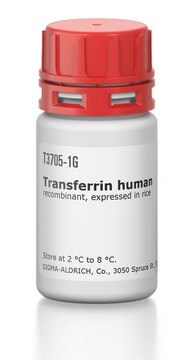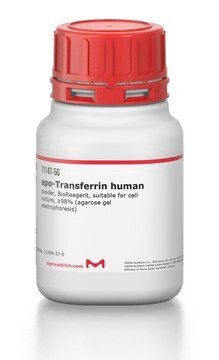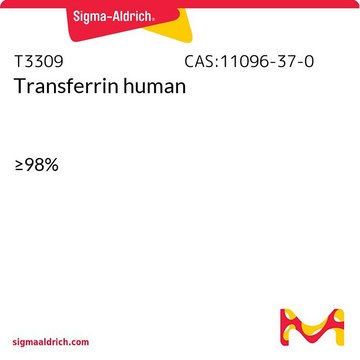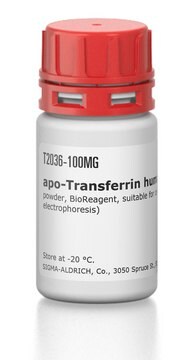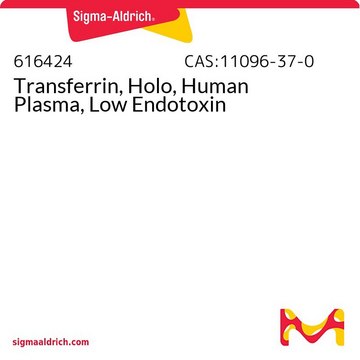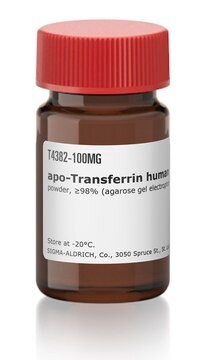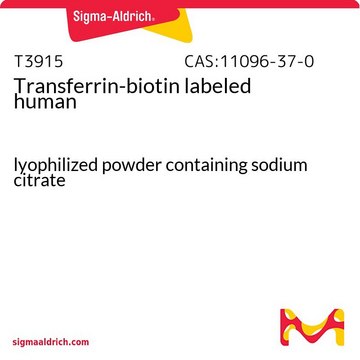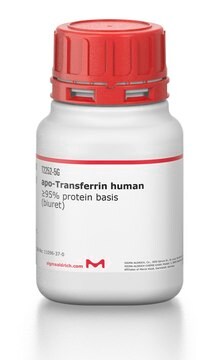T4132
holo-Transferrin human
≥98%
Synonim(y):
Siderophilin, iron-saturated
Zaloguj sięWyświetlanie cen organizacyjnych i kontraktowych
About This Item
Polecane produkty
pochodzenie biologiczne
human
Poziom jakości
Próba
≥98%
Formularz
powder
Zawartość żelaza
1100-1600 μg/g
metody
cell culture | mammalian: suitable
zanieczyszczenia
HIV, hepatitis B and hepatitis C, none detected
numer dostępu UniProt
temp. przechowywania
2-8°C
informacje o genach
human ... TF(7018)
Szukasz podobnych produktów? Odwiedź Przewodnik dotyczący porównywania produktów
Opis ogólny
Transferrin (TF) belongs to the family of bilobal glycoproteins, which bind ferric iron. The homologous N- and C-lobes of the protein have a single iron-binding site present in a deep cleft. The gene encoding TF is localized on human chromosome 3q22.1.
Zastosowanie
Human holo-transferrin has been used:
- in colony-forming assays
- for transferrin uptake and recycling in transfected HEK-293 (human embryonic kidney) cells or bone marrow cells
- for the preparation of luteinizing and non- luteinizing granulose cells
Działania biochem./fizjol.
Studies have shown that co-treatment of breast cancer cells with holo-transferrin, which increases iron levels within cells and derivatives of artemisinin results in increased cell death.
Transferrin (TF) is the iron transport protein in the blood. Iron is transported in the serum by binding to circulating transferrin, which in turn binds to receptors on the cell surface. At the alkaline extracellular pH of 7.4, TF binds one or two ferric ions. The iron-bound TF molecules can bind the dimeric transferrin receptor (TfR). At this pH, iron-free transferrin is not recognized by TfR. This is followed by an endocytotic pathway involving the TfR, where the entire complex is internalized by endocytosis. As the pH reduces in the cell, iron is released from TF. The complex then returns to the cell surface and the apo-TF molecules dissociate from the receptor.
Komentarz do analizy
Purity by agarose gel electrophoresis.
Oświadczenie o zrzeczeniu się odpowiedzialności
RESEARCH USE ONLY. This product is regulated in France when intended to be used for scientific purposes, including for import and export activities (Article L 1211-1 paragraph 2 of the Public Health Code). The purchaser (i.e. enduser) is required to obtain an import authorization from the France Ministry of Research referred in the Article L1245-5-1 II. of Public Health Code. By ordering this product, you are confirming that you have obtained the proper import authorization.
Ta strona może zawierać tekst przetłumaczony maszynowo.
Kod klasy składowania
11 - Combustible Solids
Klasa zagrożenia wodnego (WGK)
WGK 3
Wybierz jedną z najnowszych wersji:
Masz już ten produkt?
Dokumenty związane z niedawno zakupionymi produktami zostały zamieszczone w Bibliotece dokumentów.
Klienci oglądali również te produkty
Atypical serum transferrin isoform distribution in liver cirrhosis studied by HPLC, capillary electrophoresis and transferrin genotyping.
Arndt T, et al.
Clinica Chimica Acta; International Journal of Clinical Chemistry, 394(1-2), 42-46 (2008)
Selective toxicity of dihydroartemisinin and holotransferrin toward human breast cancer cells.
Singh NP
Life Sciences, 21, 49-56 (2001)
EPCR expression marks UM171-expanded CD34+ cord blood stem cells.
Fares I, et al.
Blood, 116(4), blood-b2016 (2017)
Nattawut Sinsuebphon et al.
Journal of biophotonics, 11(10), e201800037-e201800037 (2018-05-29)
Macroscopic fluorescence lifetime imaging (MFLI) has been proved to be an accurate tool to quantify Förster resonance energy transfer (FRET) lifetime-based assessment of receptor-ligand engagement in vitro and in vivo. Herein, we report on the quantitative comparison of MFLI for
Hypoxia-inducible factor 1 mediates hypoxia-enhanced synthesis of progesterone during luteinization of granulosa cells.
Yoshioka S, et al.
Journal of Reproduction and Development, 63(1), 75-85 (2017)
Protokoły
Separation of HPLC protein standard mixture, analytical standard
Nasz zespół naukowców ma doświadczenie we wszystkich obszarach badań, w tym w naukach przyrodniczych, materiałoznawstwie, syntezie chemicznej, chromatografii, analityce i wielu innych dziedzinach.
Skontaktuj się z zespołem ds. pomocy technicznej


